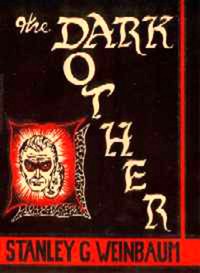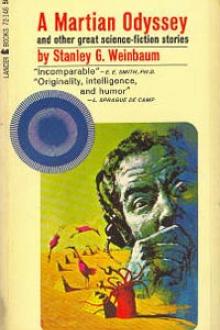The Dark Other by Stanley G. Weinbaum (pdf e book reader TXT) 📗

- Author: Stanley G. Weinbaum
Book online «The Dark Other by Stanley G. Weinbaum (pdf e book reader TXT) 📗». Author Stanley G. Weinbaum
"Is it over?" she asked listlessly.
"Not even begun," he responded. "However, it isn't too late. He'll be ready in a moment or so."
"I wish it were over," she murmured. "One way or the other."
"I too!" said the Doctor. "With all my heart, I wish it were over! If there were anyone within call who could handle it, I'd turn it to him gladly. But there isn't!"
He moved again toward the door, leaning out and glancing down the hall.
"You stay here," he admonished her. "Don't try to find us; I want no interruptions, no matter what enters that mind of yours!"
"You needn't worry," she said soberly. "I'm not fool enough for that." She leaned wearily back in the chair, closing her eyes. A long interval passed; she was vaguely surprised to see the Doctor still standing in the doorway when she opened her eyes. She had fancied him already in the midst of his labor.
"What will you do?" she asked.
"About what?"
"I mean what sort of operation will it need? Probing or what?"
"Oh," he said. "I'll have to trephine him. Must get that bullet."
"What's that—trephine?"
He glanced down the hall. "They're ready," he said, and turned to go. At the door he paused. "Trephining is to open a little door in the skull. If your devil is in his head, we'll have it out along with the bullet."
His footsteps receded down the hall.
32Revelation
"Is it over now?" queried Pat tremulously as the Doctor finally reappeared. The interminable waiting had left her even more worn, and her pallid features bore the marks of strain.
"Twenty minutes ago," said Horker. His face too bore evidence of tension; moreover, there was a puzzled, dubious expression in his eyes that frightened Pat. She was too apprehensive to risk a question as to the outcome, and simply stared at him with wide, fearful, questioning eyes.
"I called up your home," he said irrelevantly. "I told them you left with me early this morning. Your mother's still in bed, although it's after ten." He paused. "Slip in without anyone seeing you, will you, Honey? And rumple up your bed."
"If I haven't lost my key," she said, still with the question in her eyes.
"It's in the mail-box. Magda found it on the porch this morning. I talked to her."
She could bear the uncertainty no longer. "Tell me!" she demanded.
"It's all right, I think."
"You mean—he'll live?"
The Doctor nodded. "I think so." He turned his puzzled eyes on her.
"Oh!" breathed Pat. "Thank God!"
"You wanted him back, Honey, didn't you?" Horker's tone was gentle.
"Oh, yes!"
"Devil and all?"
"Yes—devil and all!" she echoed. Suddenly she sensed something strange in the other's manner. She perceived the uncertainty in his visage, and felt a rising trepidation. "What's the matter?" she queried anxiously. "You're not telling me everything! Tell me, Dr. Carl!"
"There's something else," he said. "I'm not sure, Pat, but I think—I hope—you've got him back without the devil!"
"He's cured?" Her voice was incredulous; she did not dare accept the Doctor's meaning.
"I hope so. At least I located the cause."
"What was it?" she demanded, an unexpected vigor livening her tired body. "What was that devil? Tell me! I want to know, Dr. Carl!"
"I think the best name for it is a tumor," he said slowly. "I told them in there it was a tumor. I wish I knew myself."
"A tumor! I don't understand!"
"I don't either, Pat—not fully. It's something on or beyond the border of medical knowledge. I don't think any living authority could classify it definitely."
"But tell me!" she cried fiercely. "Tell me!"
"Well, Honey—I'll try." He paused thoughtfully. "Cancers and tumors—sarcomas—are curious things, Dear. Doctors aren't at all sure just what they are. And one of their peculiarities is that they sometimes seem to be trying to develop into separate entities, trying to become human by feeding like parasites on their hosts. Do you understand?"
"No," said the girl. "I'm sorry, Dr. Carl, but I don't."
"I mean," he continued, "that sometimes these growths seem to be trying to develop into—into organisms. I've seen them, for instance—every surgeon has—with bones developing. I've seen one with a rather perfect jaw-bone, and little teeth, and hair. As if," he added, "it were making a sort of attempt to become human, in a primitive, disorganized fashion. Now do you see what I mean?"
"Yes," said the girl, with a violent shudder. "Dr. Carl, that's horrible!"
"Life sometimes is," he agreed. "Well," he continued slowly, "I opened up our patient's skull at the point where the fluoroscope indicated the bullet. I trephined it, and there, pierced by the shot, was this—" He hesitated, "—this tumor."
"Did you—remove it?"
"Of course. But it wasn't a natural sort of brain tumor, Honey. It was a little cerebrum, apparently joined to a Y-shaped branch of the spinal cord. A little brain, Pat—no larger than your small fist, but deeply convoluted, and with the pre-Rolandic area highly developed."
"What's pre-Rolandic, Dr. Carl?" asked Pat, shivering.
"The seat of the motor nerves. The home, you might say, of the will. This brain was practically all will—and I wonder," he said musingly, "if that explains the ungodly, evil fascination the creature could command. A brain that was nothing but pure will-power, relieved by its parasitic nature of all the distractions of a directing body! I wonder—" He fell silent.
"Tell me the rest!" she said frantically.
"That's all, Honey. I removed it, and I guess I'm the only surgeon in the world who ever removed a brain from a human skull without killing the patient! Luckily, he had two of them!"
"Oh God!" murmured the girl faintly. She turned to Horker. "But he will live?"
"I think so. Your shot killed the devil, it seems." He frowned. "I said it was a tumor; I told them it was a tumor, but I'm not sure. Perhaps, just as some people are born with six fingers or toes on each member, he was born with two brains. It's possible; one developed normally, humanly, and the other—into that creature we faced last night. I don't know!"
"It's what I said," asserted Pat. "It's a devil, and what you've just told me about tumors proves it. They're devils, that's all, and some day some student is going to cut one loose and raise it to maturity outside a human body, and you'll see what a devil is really like! And go ahead and laugh!"
"I'm not laughing, Pat. I'd be the last one to laugh at your theory, after facing that thing last night. It had satanic powers, all right—that paralyzing fascination! You felt it too; it wasn't just a mental lapse on my part, was it?"
"I felt it, Dr. Carl! I'd felt it before that; I was always helpless in the presence of it."
"Could it," he asked, "have imposed its will actively on yours? I mean, could it have made you actually do what it asked there at the end, just before I recovered enough sense to let out that bellow?"
"To take off—my dress?" She shivered. "I don't know, Dr. Carl.—I'm afraid so." She looked at him appealingly. "Why did I yield to it so?" she cried. "What made me find such a fierce pleasure in its kisses—in its blows and scratches, and the pain it inflicted on me? Why was that, Dr. Carl?"
"Why," he countered, "do gangsters' girls and apache women enjoy the cruelties perpetrated on them by their men? There's a little masochism in most women, and that—creature was sadistic, perverted, abnormal, and somehow dominating. It took an unfair advantage of you, Pat; don't blame yourself."
"It was—utterly evil!" she muttered. "It was the ultimate in everything unholy."
"It was an aberrant brain," said Horker. "You can't judge it by human standards, since it wasn't actually human. It was, I suppose, just what you said—a devil. I didn't even keep it," he added grimly. "I destroyed it."
"Do you know what it meant by saying it was a question of synapses?" she asked.
"That was queer!" The Doctor's voice was puzzled. "That remark implies that the thing itself knew what it was. How? It must have possessed knowledge that the normal brain lacked."
"Was it a question of synapses?"
"In a sense it was. The nerves from the two rival brains must have met in a synaptic juncture. The oftener the aberrant brain gained control, the easier it became for it to repeat the process, as the synapse, so to speak, wore thin. That's why the attacks intensified so horribly toward the end; the habit was being formed."
"Last night was the very worst!"
"Of course. As the thing itself pointed out, I made the mistake of drugging the normal brain and giving the other complete control of the body. At other times, there'd always been the rivalry to weaken whichever was dominant."
"Does that mean," asked Pat anxiously, "that Nick's character will be changed now?"
"I think so. I think you'll find him less meek, less gentle, than heretofore. More spirited, perhaps, since his energies won't be drained so constantly by the struggle."
"I don't care!" she said. "I'd like that, and anyway, it doesn't make a bit of difference to me as long as he's just—my Nick."
The Doctor gave her a tender smile. "Let's go home," he said, pinching her cheek in his great hand.
"Can you leave him?"
"I'll run back after a while, Honey. I think he'll do." He took her hand, drawing her after him. "Don't forget to slip in unseen, Pat, and rumple up your bed."
"Rumple it!" She gave him a weary smile. "I'll be in it!"
"Good idea. You look a bit worn out, Honey, and we can't have you getting sick now, or even pull a temporary faint like that one last night."
"I didn't faint!"
"Maybe not," grinned Horker. "Perhaps the proceedings grew a little boring, and you just lay down on the couch for a nap. It was a dull evening."
End of the Project Gutenberg EBook of The Dark Other, by Stanley G. Weinbaum




Comments (0)